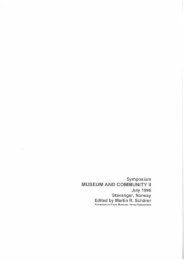Key Concepts of Museology - ICOM
Key Concepts of Museology - ICOM
Key Concepts of Museology - ICOM
Create successful ePaper yourself
Turn your PDF publications into a flip-book with our unique Google optimized e-Paper software.
34<br />
American Association <strong>of</strong> Museums).<br />
It is laid out in eight chapters which<br />
identify basic measures to allow the<br />
(supposedly) harmonious development<br />
<strong>of</strong> the museum institution<br />
within society: (1) Museums take<br />
care <strong>of</strong> the protection, documentation<br />
and promotion <strong>of</strong> the natural<br />
and cultural heritage <strong>of</strong> humanity<br />
(institutional, physical and fi nancial<br />
resources needed to open a museum).<br />
(2) Museums which maintain collections<br />
hold them in trust for the benefi<br />
t <strong>of</strong> society and its development<br />
(issues <strong>of</strong> acquisition and deaccession<br />
<strong>of</strong> collections). (3) Museums hold primary<br />
evidence for building up and<br />
furthering knowledge (deontology <strong>of</strong><br />
research or <strong>of</strong> collecting evidence).<br />
(4) Museums provide opportunities<br />
for the appreciation, understanding<br />
and management <strong>of</strong> the natural and<br />
cultural heritage (deontology <strong>of</strong> exhibiting).<br />
(5) Museums hold resources<br />
that provide opportunities for other<br />
services and benefi ts to the public<br />
(issues <strong>of</strong> expertise). (6) Museums<br />
work in close collaboration with<br />
the communities from which their<br />
collections originate as well as with<br />
those that they serve (issues <strong>of</strong> cultural<br />
property). (7) Museums operate<br />
in a legal manner (respect for the<br />
rule <strong>of</strong> law). (8) Museums operate in<br />
a pr<strong>of</strong>essional manner (pr<strong>of</strong>essional<br />
conduct and confl icts <strong>of</strong> interest).<br />
3. The third impact on museums<br />
<strong>of</strong> the concept <strong>of</strong> ethics is its contribution<br />
to the defi nition <strong>of</strong> museology<br />
as museal ethics. From this perspective,<br />
museology is not a science<br />
in development (as proposed by<br />
Stránský), because the study <strong>of</strong> the<br />
birth and the evolution <strong>of</strong> museums<br />
does not follow the methods <strong>of</strong> both<br />
human and natural sciences in so far<br />
as it is an institution that is malleable<br />
and can be reshaped. However,<br />
as a tool <strong>of</strong> social life, museums<br />
demand that endless choices are<br />
made to determine the use to which<br />
they will be put. And precisely here,<br />
the choice <strong>of</strong> the ends to which this<br />
body <strong>of</strong> methods may be subjected<br />
is none other than a choice <strong>of</strong> ethics.<br />
In this sense museology can be defi -<br />
ned as museal ethics, because it is<br />
ethics which decide what a museum<br />
should be and the ends to which it<br />
should be used. This is the ethical<br />
context in which it was possible for<br />
<strong>ICOM</strong> to build a deontological code<br />
for the management <strong>of</strong> museums,<br />
a deontology which constitutes a<br />
code <strong>of</strong> ethics common to a sociopr<strong>of</strong>essional<br />
category and serving it<br />
as a paralegal framework.<br />
CORRELATED: MORAL, VALUES, DEONTOLOGY.<br />
EXHIBITION<br />
n. (early 15c., from O.Fr. exhibicion, from<br />
Latin exhibitionem, nom. exhibitio, from exhibere<br />
‘to show, display,’ lit. ‘to hold out,’ from<br />
ex- ‘out’ and habere ‘to hold’) – Equivalent<br />
French: (from the Latin expositio, gen. espoitionis:<br />
exposé, explication) exposition; Spanish:<br />
exposición; German: Austellung; Italian:<br />
esposizione, mostra; Portuguese: exposição,<br />
exhibição.<br />
The term ‘exhibition’ refers to<br />
the result <strong>of</strong> the action <strong>of</strong> displaying
















